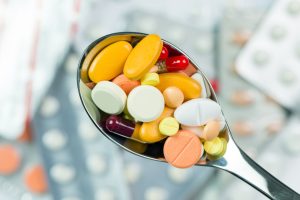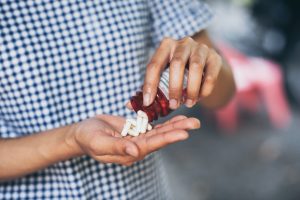Heightening the Risk of Inflammatory Bowel Disease
Hello Everyone! A Danish study wanted to determine if dosing and timing of antibiotics were important factors in the development of IBD.
More than 6.1 million individuals were included in the study derived from medical data ranging over 18 years, and the results showed that another critical factor increased the risk.
This article delves into why the side effects of antibiotics are linked to Crohn’s and ulcerative colitis, how age is associated with the likeliness of diagnosis, and how you can treat your IBD in the most effective, safest way.
If you are new to Eat Burn Sleep, many factors play pivotal roles in inflammatory bowel disease development. There are many ways to put it into remission, which are all included on this platform.
Side Effects of Antibiotics at Any Age
Can You Get IBD at Any Age?
Why Do You Have Crohn’s Disease?
What Are the Side Effects of Antibiotics?
Can Too Many Antibiotics Make You Sick?
Which Antibiotics Trigger IBD?
How Do You Reset Gut Health?

Side Effects of Antibiotics at Any Age
In the study (Faye et al. 2023) determining whether antibiotics were factors in the development of IBD, individuals had to satisfy specific criteria, and they ranged from 10 years old upwards, with no previous diagnosis of IBD—the years from January 2000 until December 2018 were studied.
It concluded that the frequent use of antibiotics that targeted gastrointestinal infections increased the risk of developing inflammatory bowel disease among males and females over 40 by 50%.
However, it also revealed that antibiotic use at any age, including 10 years old and upwards, increased the risk of developing Crohn’s disease and ulcerative colitis.
Each added course of antibiotics over the years from January 2000 until December 2018 created additional risk – the highest risk is seen after 1-2 years following antibiotic courses.

Can You Get IBD at Any Age?
Yes, you can get inflammatory bowel disease at any age, following antibiotics. The study showed the percentage of individuals that would be more likely to be diagnosed with IBD were:
- 28% for 10 – 40 years old
- 48% for 40 – 60 years old
- 47% for those over 60 years old.
Why Do You Have Crohn’s Disease?
Please explore this platform to delve into the cause of Crohn’s disease and, indeed, become a member to put your Crohn’s disease into remission, but one reason could be down to antibiotics.
The study mentioned above revealed that the risk of developing Crohn’s disease after a course of antibiotics was:
- 40% for individuals aged 10 to 40 years old
- 62% for 40 to 60 years old
- 51% for those over their 60s.
Each course of antibiotics added an additional 11%, 15%, and 14%, respectively.

The figures were slightly lower for the risk of developing ulcerative colitis but still as significant.
The outcome showed that anyone at any age who has had five lots of antibiotic courses or more was twice as likely to develop an inflammatory bowel disease than someone who has not been on antibiotics.
What Are the Side Effects of Antibiotics?
Antibiotics change the microbial environment in the gastrointestinal tract, decreasing diversity and increasing susceptibility to disease development.
Our gut microbiota, which we carry around 4-5lbs of in our gut, changes continuously. It is home to an array of microorganisms that consist of bacteria, fungi, protozoa, and viruses. They are paramount to our health.

Our microbiota is made up of our genes, food, drink, and what we are exposed to.
Everything we imbibe will feed the good or harmful bacteria or wipe out all the good.
This includes everything around us. The air we breathe, how we live and eat, and even our thoughts.
Everything we do impacts our gut microbiota.
Everything our gut microbiota does affects us.
This includes aging.
Age impacts our microbiota.
It was found that aging adults have decreased Bifidobacterium in their gut, also seen in IBD patients.

Age-related changes like lifestyle factors can be made worse by antibiotic use, which depletes microbiota diversity, increases candida and thrush, and can have long-term effects.
Recovery from antibiotics takes younger people less than a month to recover, but it takes much longer in older people.
Can Too Many Antibiotics Make You Sick?
Gut microbiota is affected by antibiotics, medication, drugs, sickness, and stress.
So, the antibiotics cause gut dysbiosis, which is linked to chronic inflammation and IBD: Crohn’s, Colitis, and Diverticulitis, as well as other chronic inflammatory diseases.
So, you can imagine that repeat prescriptions over a period of time limit microbiota recovery.

Children are still at risk of developing IBD after antibiotics, but much less. The slow and limited recovery that comes from aging, combined with repeated dysbiosis (unbalanced gut microbiota diversity) from the antibiotics, puts a person over 40 in a perpetual state of susceptibility to disease.
Antibiotic use is a trigger for Crohn’s and Ulcerative Colitis development.
Which Antibiotics Trigger IBD?
All antibiotics and medications cause microbiota diversity and metabolic changes. The overgrowth of pathogens occurs, and antibiotic-resistant bacteria multiply, for instance.

Antibiotics can wipe out all the good bacteria, leading to inflammatory diseases and immune dysregulation. 70% of immune cells reside in your gut, you see.
So, by using antibiotics to fight an infection, you are actually making your body more susceptible to disease and viruses.
Wiping out good bacteria and pathogens results in the body being even less healthy than before.
This also highlights how medication can cause chronic inflammation and reduced immunity through gut dysbiosis and how medicine can not be effective after a while.

Gut microbiota is imperative to human health and can be disrupted by many lifestyle factors, antibiotics, and medication.
It is constantly changing.
It can be changed positively to an optimal state as our environments allow.
Have you read NSAIDs, Gut Health & Inflammation, Painkillers Not Helping Your Headaches?, Why Aspartame Is Linked to Cancer, & Can Food Poisoning Cause Inflammation?
How Do You Reset Gut Health?
Resetting your system starts here. Our 6-week reset enables you to recover from antibiotic use and dysbiosis, regardless of age.
The 6-week reset reboots the immune system and reduces inflammation, which improves your mental well-being and will cause weight loss, give you more energy, and make you feel and look incredible.
I would suggest that in addition to week 1 advice, follow the advice that I share for Candida Overgrowth for more recommendations to reduce bacterial overgrowth.

It’s a powerful protocol for resetting your health and taking control of your IBD, reducing Crohn’s and colitis triggers.
It takes 21 days to revive your mind and body and 42 to feel absolutely incredible!
Then, you maintain your lifestyle with 300+ microbiota-loving recipes, keeping you in tip-top health, having what you like now and again, which will keep you happy.
The platform has amazing craving hacks, but remember, it is not about perfection. Follow the EBS method 80% of the time. Have those foods and drinks that you love, too.
Nothing is cut out 100% (keeping the bacteria), which keeps many people feeling unrestricted.
Aiming for an 80/20 mindset most of the time allows you to dip to 70/30 and sometimes 60/40. You just jump back when you can. It is all about damage limitation, and it works!

The wonderful thing is that you feel it, and as you get to know your body more through the marked changes that Eat Burn Sleep promotes, you are more likely to be on this IBD and chronic disease-reducing lifestyle effortlessly.
Incremental changes over a year make a massive difference.
Plus, your gut microbiota won’t want those trigger foods one day.
It’s hard to believe right now, but it’s true! It’s amazing. Don’t just take my word for it; check out the testimonials.
Remember to go easy on yourself, and have a wonderful day.


